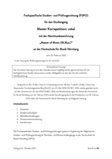for studies starting in winter semester 2021/22Subject-specific study and examination regulations (German)
The subject-specific study and examination regulations form the legal basis for your degree programme. They contain all the information you need to know about your studies, including module descriptions and how your grades are calculated.
-
Master Korrepetition: vokal (2021)
Size:298 KB pdf
Professional field for which the degree programme qualifies
The Master's degree in Vocal Accompaniment prepares students for a future career in which they will work primarily as an accompanist in a conservatory, opera house, music school or as a freelance pianist.
In addition to solo and chamber music concerts and teaching, accompaniment is another area of the pianist's working life in which they can find a wide range of professional opportunities. Singers, in particular, rely on the help of an accompanist to rehearse their repertoire and, of course, to perform.
This places high demands on graduates in terms of both artistic ability and personality, as well as the ability to grasp the demands of the vocal repertoire quickly and in depth, to convey musical content and to help singers in all aspects. The course also aims to provide students with the necessary artistic skills for a possible career in tertiary education. in the tertiary education sector.
